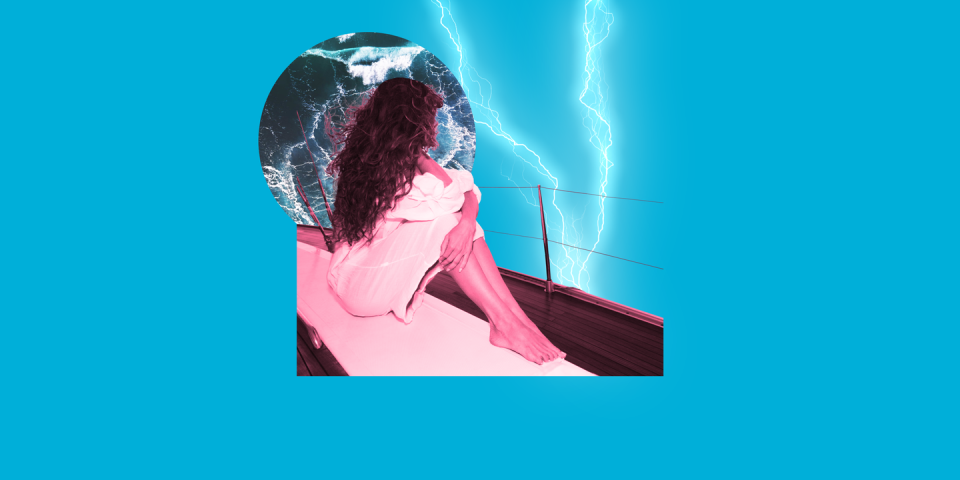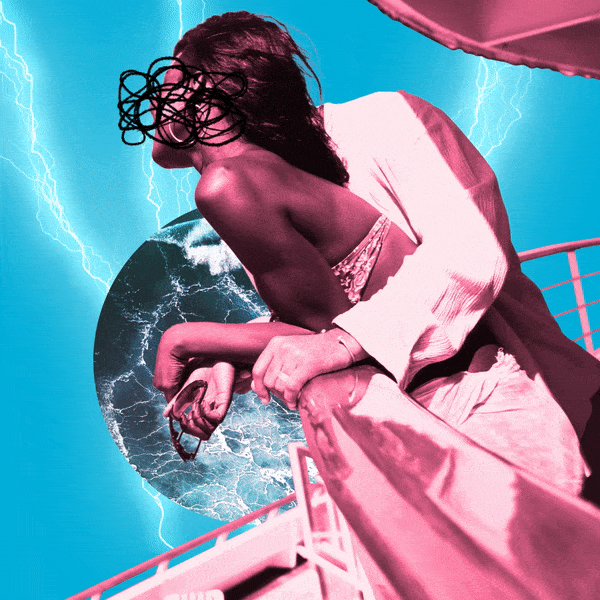The toxic truth about working as a yacht girl

Warning: This article contains references to rape, and sexual assault. If you need support with any of these issues, please contact Rape Crisis or Rape Crisis Scotland.
Valerie*’s head is spinning. “Are you okay?” her fellow stewardess asks. “You seem quite drunk.” Valerie reassures her colleague that she’s fine and tells her to go down for the night. She can look after the guests on her own – she only had half a rum and coke at dinner with them earlier, after all.
After checking on the downstairs guests, Valerie remembers that one asked for a drink on the top deck. It’s the same middle-aged man who was smiling at her from across the dinner table, the same man whose unwelcome compliments became more intense as the night worn on. She makes her way upstairs, his drink in hand.
The next thing Valerie knows, she’s lying on the cold floor of the yacht’s top deck. It’s dark, but the Mediterranean moon illuminates the silhouette towering above her.
“Take your underwear off,” the guest demands. Valerie refuses, but she can’t keep her eyes open.
“Have you noticed that Kat has really nice tits?” one of the guests asks the table. It’s dinner service during the first series of Below Deck, and stewardess Kat is visibly overwhelmed, hiding her rosy face with her hands. The guest continues to quiz her. “How many CCs are those? Are you wearing a bra?”

The show – which follows a crew of ‘yachties’ as they work, argue and drink their way through a season of luxurious charters in the Caribbean – has proven itself a viewer favourite in an era where we’ve all been desperate to escape pandemic reality. The hopeless crew romances, high maintenance guests and generous cash tips certify the show as binge-worthy viewing. But something not so easy to stomach is the recurring sexual harassment of the female crew.
In season four, stewardess Emily is asked by a drunk guest if he can “see her V”. Simone is pursued by a guest in season seven, who mimics his erection over the stewardess with his hand down his shorts. And in season five, Jen is groped by a guest as she serves dinner.
“Unfortunately, a guest will be served too much [alcohol], so they think, ‘Hey, I can sexually harass the crew’,” chief stewardess Kate explains. “As an experienced yachtie, you learn how to deal with these kinds of guests.”
When asked to comment on the alarming scenes ahead of the show’s ninth series, which premiered on Monday 25 October, a Bravo spokesperson said: “Prior to the start of production each season, there is Respect in the Workplace training that the Below Deck cast participates in, which includes increased focus around sensitivity training.”
But if this is what we see when on a heavily edited reality show, what happens on yachts around the world where there are no cameras rolling? To investigate, Cosmopolitan spoke to three former yacht crew members (often known as 'yacht girls') about their experiences. To protect these women, their identities have been hidden.
Growing up in Florida, Jessica* always loved boats so a career in yachting was a no-brainer. “The money's great and you get to visit some incredible places,” the 26-year-old explains. On top of a basic salary, the most she’s made in tips is $2,800 for a two-day charter. But despite this, after seven years, Jessica’s taking a break. “I had to walk away. There was no way I could do my job and live a happy life.”
Physical harassment has been rife aboard all of the yachts she’s worked on. “I’ve had my butt grabbed, my boobs fondled… it’s very rare to have a time where something doesn’t happen,” she tells Cosmopolitan.
And Jessica’s not alone – she doesn’t know a single woman in the industry who hasn’t been harassed in some way. “Everybody has a story, unfortunately,” she says.
Money talks
With no HR department on hand to offer support, Jessica says that when she’s reported these instances to senior colleagues, she’s typically met with a "too bad" or "oh well". A complaint against a guest, especially a millionaire, has the potential to impact the entire crew’s tip – and their reputations.
“These people have a lot of money, so it’s intimidating,” she says. “Behaviour like this is always swept under the rug.” She goes on to stress that male colleagues aren’t much help either – “90% of the time, if they’re not hooking up with you, they don’t care about anything that happens to you.”
When the owner of the private yacht Tamsin* worked on started making suggestive comments, she was too scared to confront him. “I wanted to do a good job because that first role is so important on your CV,” she explains. “I just smiled and didn’t say how uncomfortable I felt.” The 33-year-old started her career on the yacht in Fort Lauderdale but quit after three months.
“He said he wanted to buy me butt implants and stripper heels so he could watch me walk around the boat in them,” Tamsin says. The man, whose wife was often on board, would regularly enter the cabin as Tamsin prepared it for the evening and make uncomfortable remarks to her about the "romantic atmosphere" in the room. “He’d gesture at me, making it weird... I never wanted to be stuck in that room with him.”
It was 2019 when Valerie’s drink was spiked and she was raped by a guest on the top deck of the private Mediterranean yacht she was working on. “I didn’t feel human the next day,” she recounts, tears forming in her eyes. “I was in complete shock.” After the guest, who was staying onboard as an acquaintance of the owner, left the vessel, Valerie told the captain. “The captains have the power to stop these things from happening,” she tells us. “The captains can stand up to guests.”
But instead of protecting Valerie, he lost it with her. The night she was raped, the captain was, in Valerie’s words, "plastered". “Had he done his job properly and not gotten drunk, he would have noticed something weird was happening at the dinner and could’ve pulled me away,” she says.
Different rules at sea
Valerie says the captain was worried she would tell people she was raped on his yacht and ruin his career. To silence her, the captain threatened not to give Valerie a reference, telling her that by leaving his boat mid-season she’d put off future employers. “I was trapped,” she says. “He told me he had the contacts to take me down faster than I could even try to take him down.”

Immediately after her attacker left the yacht, another six-day trip began. Still coming to terms with the rape and its subsequent psychological impact, and while still working demanding 20-hour shifts, Valerie had even more concerns to contend with – was she pregnant? Did she have an STI? She pleaded with the captain to let her see a doctor, but he refused to let her leave the boat until the charter was over. “He told me the boss needed to have a good time. That was what was important.”
After flying home for two days to see her family doctor and receiving the all-clear, Valerie had to return to the boat to complete the season. If she didn’t, her reputation and future in the industry were both at risk. And if the guest who spiked and raped her returned? “I was told I’d have to treat him with the same respect as any other guest because it’s not about me,” she says. “These men have created a systemic monster that survives because they silence us all, and they’re not going to let us have a voice too easily.”
Nautilus is an international union offering guidance for maritime professionals experiencing harassment. “Sexual harassment is completely unacceptable whether it happens on a private [owned by an individual for trips with their family, friends and employees] or charter yacht [rented by families and groups for one-off trips],” they tell Cosmopolitan. “We ensure that the correct protocol, procedures and reporting are undertaken during any investigation, with the welfare and safety of crew members remaining our highest priority.”
While support may be available, Valerie explains that for junior crew, going to a union could “destroy a career” if word gets out. Meanwhile, both Jessica and Tamsin were unaware that such bodies even existed.
“When people get on a yacht, a switch flicks in their brain and they think they can do whatever they want,” says Marien Sarriera. A radio host and former yacht worker of 14 years, Marien is the founder of Yachts Mermaids, an online platform that provides resources and support for female yacht crew. She explains that the rules at sea are grey and that it’s a lot harder to enforce the law on board than it is on land. “These men see young girls as easy targets,” she says.
But Marien wants these victims to understand that they themselves hold the power. “It’s the predator’s reputation on the line, whether it’s an accomplished captain or an affluent, established guest,” she says. “These men know people. They’ve worked their way up. It’s their reputation that is really at risk.’
Stand together
Marien is well aware that wealth and connections are used to intimidate and stifle victims, but she believes that women who come together possess an undeniable strength: “I’ve been trying for years to get a group of women to come forward together, similar to the women in Jeffrey Epstein’s case.”
In a 2018 survey by the International Seafarers’ Welfare and Assistance Network, over half of female yacht crew said they experience harassment, discrimination or bullying on board ‘often’ or ‘always’. Reform is clearly needed to end the toxic current of sexual exploitation and silence culture at sea – for crew now and for the generations that come afterwards. But what does reform look like?
All of the women agree that crew – including captains – need training. They need to be taught how different forms of harassment manifest so they identify and deal with the situation appropriately. Ultimately, for women to take these kinds of positions, they need to be able to trust that a captain will have their back – especially when they are hundreds of miles away from home and their trusted safety networks. “If a captain can’t tell you the policies they have in place for an onboard rape or instance of harassment, a woman should not be anywhere near their boat,” Marien argues.
But the solution doesn’t end with the captains. “The people doing crew placement or yachting courses, anyone bringing people into the industry, they need to take responsibility,” she continues. "It’s crucial that the dark realities of yachting, alongside the exotic destinations and healthy cash tips that come with the job, are made clear to budding crew from the beginning."
“People need to realise the extent of this problem and how regularly it’s happening,” says Valerie. “Even now I’m nervous to talk about it because I know how wealthy and connected those owners are.” After three years at sea, she’s leaving the industry to go back to university.
“There’s that saying, ‘I’m not what has happened to me, I am what I choose to become’, and I believe it. I just hope that nobody else has to go through what I’ve been through.”
*names have been changed
If you need support with any of the issues raised in this article, please contact Rape Crisis or Rape Crisis Scotland.
You Might Also Like

 Yahoo Finance
Yahoo Finance 